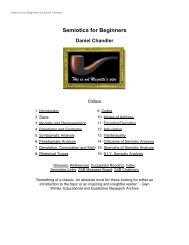Semiotics for Beginners by Daniel Chandler
Semiotics for Beginners by Daniel Chandler
Semiotics for Beginners by Daniel Chandler
You also want an ePaper? Increase the reach of your titles
YUMPU automatically turns print PDFs into web optimized ePapers that Google loves.
<strong>Semiotics</strong> <strong>for</strong> <strong>Beginners</strong> <strong>by</strong> <strong>Daniel</strong> <strong>Chandler</strong><br />
world which was reported <strong>by</strong> Jourard in the 1960s is noticeably different now. Saussure, of course,<br />
focused on sychronic analysis and saw the development of a language as a series of synchronic<br />
states. Similarly, Roman Jakobson and his colleague Yuri Tynyanov saw the history of literature as a<br />
hierarchical system in which at any point certain <strong>for</strong>ms and genres were dominant and others were<br />
subordinate. When dominant <strong>for</strong>ms became stale, sub-genres took over their functions. Historical<br />
change was a matter of shifting relations within the system (Eagleton 1983, 111). Unlike Saussure,<br />
the French historian of ideas Michel Foucault focused not on the 'language system' as a<br />
homogeneous whole but on specific 'discourses' and 'discursive practices'. Each historical period has<br />
its own épistème - a set of relations uniting the various discursive practices which shape its<br />
epistemologies. For Foucault, specific discourses such as those of science, law, government and<br />
medicine are systems of representational codes <strong>for</strong> constructing and maintaining particular <strong>for</strong>ms of<br />
reality within the ontological domain (or topic) defined as relevant to their concerns. A particular<br />
'discursive <strong>for</strong>mation' is dominant in specific historical and socio-cultural contexts and maintains its<br />
own 'regime of truth'. A range of discursive positions is available at any given time, reflecting many<br />
determinants (economic, political, sexual etc.). Foucault focused on power relations, noting that within<br />
such contexts, the discourses and signifiers of some interpretative communities are privileged and<br />
dominant whilst others are marginalized. The non-employment of dominant codes is a mark of those<br />
who are 'outsiders' - a category which includes both <strong>for</strong>eigners from other cultures and those who are<br />
marginalized within a culture. On the other hand people who feel marginalized are often very wellattuned<br />
to analogue nuances within dominant social codes - if you want to codify stereotypical<br />
straight male behaviour try asking a gay man to describe it.<br />
We learn to read the world in terms of the codes and conventions which are dominant within the<br />
specific socio-cultural contexts and roles within which we are socialized. In the process of adopting a<br />
'way of seeing' (to use John Berger's phrase), we also adopt an 'identity'. The most important<br />
constancy in our understanding of reality is our sense of who we are as an individual. Our sense of<br />
self as a constancy is a social construction which is 'over-determined' <strong>by</strong> a host of interacting codes<br />
within our culture (Berger & Luckmann 1967; Burr 1995). 'Roles, conventions, attitudes, language - to<br />
varying degrees these are internalized in order to be repeated, and through the constancies of<br />
repetition a consistent locus gradually emerges: the self. Although never fully determined <strong>by</strong> these<br />
internalizations, the self would be entirely undetermined without them' (Nichols 1981, 30). When we<br />
first encounter the notion that the self is a social construction we are likely to find it counter-intuitive.<br />
We usually take <strong>for</strong> granted our status as autonomous individuals with unique 'personalities'. We will<br />
return later to the notion of our 'positioning' as 'subjects'. For the moment, we will note simply that<br />
'society depends upon the fact that its members grant its founding fictions, myths or codes a taken<strong>for</strong>-granted<br />
status' (Nichols 1981, 30). Culturally-variable perceptual codes are typically inexplicit, and<br />
we are not normally conscious of the roles which they play. To users of the dominant, most<br />
widespread codes, meanings generated within such codes tend to appear 'obvious' and 'natural'.<br />
Stuart Hall comments:<br />
Certain codes may... be so widely distributed in a specific language community or culture, and<br />
be learned at so early an age, that they appear not to be constructed - the effect of an<br />
articulation between sign and referent - but to be 'naturally' given. Simple visual signs appear<br />
to have achieved a 'near-universality' in this sense: though evidence remains that even<br />
apparently 'natural' visual codes are culture-specific. However, this does not mean that no<br />
codes have intervened; rather, that the codes have been profoundly naturalised. (Hall 1980,<br />
132)




